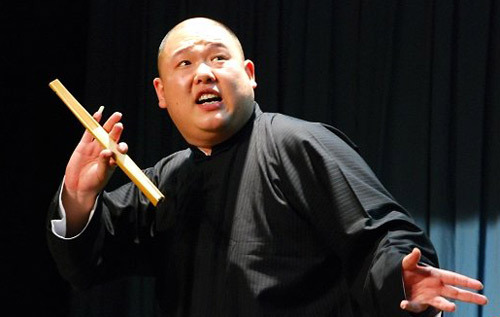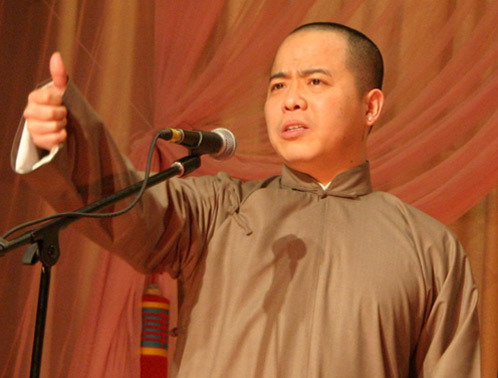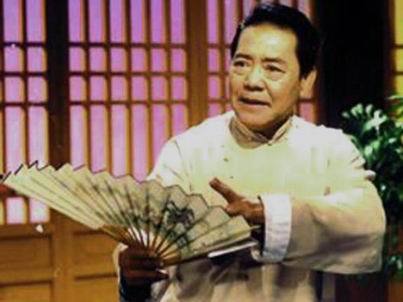The uniquely Chinese art form, pingshu, is enjoying a resurgence in popularity thanks to a new generation of performers.
It's 7:30 on a humid summer evening in Beijing. Around 30 people gather on the upper floor of Mako, a newly-renovated music venue outside the East Third Ring Road, which has been transformed from an old, high-roofed factory. Posters of rock bands line the walls.
|

Wang Yuepo, a pingshu performer in Beijing, attracts a large following for his humorous way of telling a story.
|
However, the audience is here not for the rock bands playing downstairs, but for Wang Yuepo, a pingshu performer, who attracts a large following.
Performed for centuries in the northern provinces, pingshu is a popular entertainment that features a solo performer who tells a story, especially the historic classics, such as Romance of the Three Kingdoms and The Story of Sui and Tang Dynasties, with simple and witty comments built around body language and facial expressions.
Wearing a long robe and holding a folded fan and a gavel in his hands, the 32-year-old performer sits behind a table against a simple blue backdrop. He tells a story set during the Qing Dynasty (1644-1911) about a smart 5-year-old boy who is abducted by a criminal, but returns home safely to become a favorite of the emperor.
No other performers support Wang. Nor does he use any multimedia to add color to the stories during his 90-minute performance. He just tells the story while adding humorous and vivid analysis of the characters.
During his storytelling, he frowns, laughs aloud or has a mischievous twinkle in his eyes. He also points at his own face when explaining how lovely the boy was, making fun of his own looks.
The audience laughs at his jokes and enthusiastically follows the story, requesting more tales after Wang finishes his performance.
"See, calling for an encore is not just for big pop stars. It also works for pingshu performers," Wang says.
While the older generation often laments how ancient Chinese art forms are under threat, young comedians are trying to keep the ancient art of pingshu alive and fashionable and have sparked a surge in popularity for the ancient art by reinventing the format with the inclusion of topical jokes and satire.
"Pingshu means storytelling and adding our own commentaries. I will explain what a bird looks like by referring to the owl from Harry Potter movies. I will also describe a strong man by counting how many tattoos he has," Wang explains. "After all, I have to lock the audience on their seats for two hours by arousing their interest, rather than fastening them on the chairs."
"The topics we talk about are old stories but we introduce today's popular culture to reflect what our generation thinks," says Wang, a Beijinger who has studied pingshu and xiangsheng, or crosstalk, since he was 8.
The cultural halls in Xuanwu district and Chongwen district are where much of this comedic revival is being performed. Though many other theaters in Beijing also put on regular pingshu shows. Informally dubbed New Beijing, New Pingshu, the performances are popular. Affordable tickets, just 30 yuan (US$4.4), also help bring in the crowds.
The audience includes 30-something couples with their kids and elderly couples in their 60s, who come to watch the performances every week. The performances are also hugely popular on the Internet.
"The audiences are entertained, educated and enlightened. That is the charisma of pingshu," says Xu Deliang, another Beijing pingshu performer, who has studied pingshu and xiangsheng since childhood.
|

Xu Deliang is among the young comedians who keep the ancient art of pingshu fashionable.?
|
Xu, 32, studied Classic Chinese Literature and graduated from Peking University. He has been working for an international company since he graduated. But his love of Chinese traditional performances drove him back to the stage.
"For me, pingshu is much more difficult than xiangsheng, which can be two, or more performers on the stage. Pingshu requires the performer to be knowledgeable and skilled in the use of language so they can hold the attention of the audiences for one hour or more," he says. "It is full of Chinese characteristics and the rich colors of Chinese aesthetics."
"I like the fact that the art form of pingshu is uniquely Chinese. It's like Chinese people eating with chopsticks," Xu adds. "The Chinese language is such a sophisticated language and that's what makes pingshu and crosstalk so special."
Xu rose to fame five years ago as a partner of Guo Degang, a crosstalk performer who heads a team of 130 comedians across town at the Deyunshe Theater in south Beijing, and is credited with reviving interest in traditional Chinese quyi, which refers to traditional art forms, ballad singing, storytelling, clapper talk and cross talk in particular.
Pingshu is a traditional art form popular in northern China, especially Beijing and Tianjin. Pingshu radio shows were extremely popular in the 1970s and 1980s. The elderly would sit in a comfortable bamboo chair enjoying the stories while sipping tea. Students would go home at noon to listen while having lunch. A section of a story lasted half an hour, and it was broadcast three times a day. Foreigners who visit Beijing will often find taxi drivers are listening to a Pingshu performance.
Pingshu performers such as Shan Tianfang, Lian Liru and Tian Lianyuan were popular among pingshu fans.
|

Famous pingshu performer Shan Tianfang.
|
Over the past two decades, pingshu has lost its popularity as TV has entered the homes of most Chinese families.
"There are few places to watch pingshu performances and some pingshu performers have switched to other occupations because it's hard to make a decent living," Xu says.
"I'm positive about the future because I think people will always want to remember the classics which have kept them company for generations," says Xu.
(China Daily June 30, 2010)